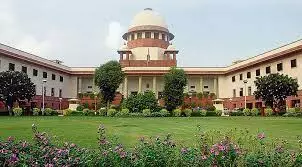
J&K's Union Territory status not permanent, Centre tells Supreme Court
The apex court sought a timeframe on restoration of democracy, saying lack of electoral democracy cannot be allowed to go on indefinitely

The Centre told the Supreme Court on Tuesday that the Union Territory status of Jammu and Kashmir is not a “permanent thing” and that it will make an elaborate statement on the vexatious political issue in the court on August 31.
The central government’s response was conveyed to the court by Solicitor General Tushar Mehta, after a five-judge constitution bench headed by Chief Justice DY Chandrachud, hearing the pleas challenging the abrogation of Article 370, asked it to set a specific time frame for restoration of electoral democracy in the erstwhile state.
Restore democracy in J&K: SC
“The Union Territory status of Jammu and Kashmir is not a permanent thing. So far as Ladakh is concerned, its UT status is going to remain for some time,” Mehta said. The top government law officer said he will make an elaborate statement on the future of the UT status of J&K and Ladakh before the bench, which also comprises Justices Sanjay Kishan Kaul, Sanjiv Khanna, BR Gavai and Surya Kant, on August 31.
Also read: SC dismisses plea seeking declaration Article 370 abrogation constitutionally valid
The bench, which was hearing Mehta’s submissions defending the Centre’s decision to do away with the special status of the former state and its reorganisation, said, “Democracy is important, although we agree that in view of the national security scenario, reorganisation of the state can be done.” The court, however, said lack of electoral democracy cannot be allowed to go on indefinitely.
“This has to come an end... give us the specific timeframe as to when will you restore actual democracy. We want to record this,” the bench said, and asked Mehta and Attorney General R Venkataramani to seek instructions from the political executive and get back to the court.
‘Article 35A took away rights’
Chief Justice of India DY Chandrachud on Monday observed that by enacting Article 35A, fundamental rights of equality, liberty to practice profession in any part of the country and others were virtually taken away.
He made the remarks after Solicitor General Tushar Mehta, appearing for the Centre, referred to the contentious provision in the Indian Constitution, saying it gave special rights to only permanent residents of the erstwhile state and was discriminatory. Without naming the two mainstream political parties of the erstwhile state, the Centre told a five-judge bench headed by CJI Chandrachud that citizens have been misguided that the special provisions for Jammu and Kashmir were “not discrimination but a privilege”.
“Even today two political parties are before this court defending Article 370 and 35A,” the solicitor general told the top court on the 11th day of hearing the litany of pleas challenging the abrogation of the constitutional provision which bestowed special status to the erstwhile state of J&K.
Also read: Terror activities surge in Jammu region post Article 370 abrogation
The solicitor general further submitted that the effect of Article 370 was such that by the administrative act of the President and the state government, any part of the Constitution of India with respect to J&K can be amended, altered or even “destroyed” and new provisions can be created. He said that after the 42nd amendment, the words “Socialist” and “Secular” were not made applicable to Jammu and Kashmir.
“Even the word “Integrity” is not there. Fundamental duties were not there, which exists in the Indian Constitution. The Jammu and Kashmir Constitution provided for a separate provision for permanent residents of J&K in Article 7. It removed references to Scheduled Tribes from Article 15(4). Other Articles 19, 22, 31, 31A and 32 were applied with some modifications…,” Mehta said.
Centre dubs it discriminatory
On Article 35A, he said it was discriminatory, to say the least. “Under the provision (A-35A), people like sanitation workers working in the erstwhile state for decades were not given equal rights like that of permanent residents of J&K. This discrimination continued till the provision was abrogated in 2019. Non-permanent residents of J&K were not able to purchase lands, could not avail scholarship, employment in the state government,” he said, urging the court to look into issues from the “eyes of people”.
CJI Chandrachud deciphering Mehta’s submissions said that by enacting Article 35A, “you virtually took away fundamental rights” of equality, liberty to practice profession in any part of the country and even granted immunity from legal challenges and the power of judicial review.
Also read: Article 370: SC questions issuance of constitutional orders for J-K post-1957
The Solicitor General said, “People were misguided by those - who were supposed to guide them - that this was not a discrimination but a privilege. Even today two political parties are before this court defending Article 370 and 35A.” Mehta submitted that the Constitution of Jammu and Kashmir needed to be repealed because it could not co-exist with the Indian constitution.
The apex court also prima facie agreed with the Centre’s submission on pleas challenging the abrogation of Article 370 that the Constitution of Jammu and Kashmir is “subordinate” to the Indian Constitution, which is on a higher pedestal.
The bench, however, did not seem to agree with the plea that the Constituent Assembly of the erstwhile state, which was disbanded in 1957, was in reality a legislative assembly.
(With agency inputs)

